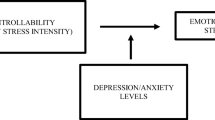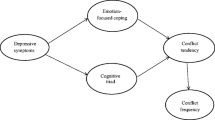Abstract
The present study investigated interactions between cognitive appraisals of, and coping with, stressful life events and their relationship with psychological symptomatology. Specifically, the “goodness of fit” between appraisals of the controllability of events and the use of problem- and emotion-focused coping was assessed for major life events and daily hassles. In relation to major life events, symptomatology was high when there was a poor fit between appraisals and coping (e.g., trying to change a stressor that was appraised as uncontrollable) and low when there was a good fit between appraisals and coping (e.g., palliating one's emotions when a stressor was perceived as uncontrollable). No effects were found in relation to daily hassles. Results were generally consistent with cognitive-transactional models of stress and coping.
Similar content being viewed by others
References
Aldwin, C., Folkman, S., Schaefer, C., Coyne, J., & Lazarus, R. (1980, September).Ways of Coping Checklist: A process measure. Paper presented at the annual meeting of the American Psychological Association, Montreal, Canada.
Compas, B. E., Davis, G. E., & Forsythe, C. J. (1985). Characteristics of life events during adolescence.American Journal of Community Psychology, 13 677–691.
Coyne, J. C., Aldwin, C., & Lazarus, R. S. (1981). Depression and coping in stressful episodes.Journal of Abnormal Psychology, 90 439–447.
DeLongis, A., Coyne, J. C., Dakof, G., Folkman, S., & Lazarus, R. S. (1982). Relationship of daily hassles, uplifts, and major life events to health status.Health Psychology, 1 119–136.
Derogatis, L. R., Lipman, R. S., Rickels, K., Uhlenhuth, E. H., & Covi, L. (1974). The Hopkins Symptom Checklist (HSCL): A measure of primary symptom dimensions. In P. Pichot (Ed.),Psychological measurements in psychopharmacology. Modern problems in pharmacopsychiatry (Vol. 7). Bassel: Karger.
Felton, B. J., & Revenson, T. A. (1984). Coping with chronic illness: A study of illness controllability and the influence of coping strategies on psychological adjustment.Journal of Consulting and Clinical Psychology, 52 343–353.
Folkman, S. (1984). Personal control and stress and coping processes: A theoretical analysis.Journal of Personality and Social Psychology, 46 839–852.
Folkman, S., & Lazarus, R. S. (1980). An analysis of coping in a middle-aged community sample.Journal of Health and Social Behavior, 21 219–239.
Folkman, S., & Lazarus, R. S. (1985). If it changes it must be a process: A study of emotion and coping during three stages of a college examination.Journal of Personality and Social Psychology, 48 150–170.
Folkman, S., Lazarus, R. S., Dunkel-Schetter, C., DeLongis, A., & Gruen, R. J. (1986). Dynamics of a stressful encounter: Cognitive appraisal, coping, and encounter outcomes.Journal of Personality and Social Psychology, 50 992–1003.
Folkman, S., Lazarus, R. S., Gruen, R. J., & DeLongis, A. (1986). Appraisal, coping, health status, and psychological symptoms.Journal of Personality and Social Psychology, 50 571–579.
Folkman, S., Schaefer, C., & Lazarus, R. S. (1979). Cognitive processes as mediators of stress and coping. In V. Hamilton & D. M. Warburton (Eds.),Human stress and cognition (pp. 265–298). Chichester, England: Wiley.
Kanner, A. D., Coyne, J. C., Schaefer, D., & Lazarus, R. S. (1981). Comparison of two modes of stress measurement: Daily hassles and uplifts versus major life events.Journal of Behavioral Medicine, 4 1–39.
Lazarus, R. S., & Folkman, S. (1984).Stress, appraisal, and coping. New York: Springer.
Lerner, J. V., Baker, N., & Lerner, R. M. (1985). A person-context goodness of fit model of adjustment. In P. C. Kendall (Ed.),Advances in cognitive behavioral research and therapy (Vol. 4, pp.111–136). New York: Academic Press.
Miller, S. M. (1981). Predictability and human stress: Toward a clarification of evidence and theory. In L. Berkowitz (Ed.),Advances in experimental social psychology (Vol. 14, pp. 203–256). New York: Academic Press.
Miller, S. M., & Mangan, C. E. (1983). Interacting effects of information and coping style in adapting to gynecologic stress: Should the doctor tell all?Journal of Personality and Social Psychology, 45 223–236.
Mischel, W. (1984). Convergences and challenges in the search for consistency.American Psychologist, 39 351–364.
Parkes, K. R. (1984). Locus of control, cognitive appraisal, and coping in stressful episodes.Journal of Personality and Social Psychology, 46 655–668.
Stone, A. A., & Neale, J. M. (1984). New measure of daily coping: Development and preliminary results.Journal of Personality and Social Psychology, 46 892–906.
Vitaliano, P. P., Russo, J., Carr, J. E., Maiuro, R. D., & Becker, J. (1985). The Ways of Coping Checklist: Revision and psychometric properties.Multivariate Behavioral Research, 20 3–26.
Author information
Authors and Affiliations
Additional information
The authors wish to thank Sue Rolka for her assistance in data collection and analysis, Harold Leitenberg for comments on an earlier draft of this paper, and Carol Miller and David Howell for comments regarding data analysis.
Rights and permissions
About this article
Cite this article
Forsythe, C.J., Compas, B.E. Interaction of cognitive appraisals of stressful events and coping: Testing the goodness of fit hypothesis. Cogn Ther Res 11, 473–485 (1987). https://doi.org/10.1007/BF01175357
Issue Date:
DOI: https://doi.org/10.1007/BF01175357




